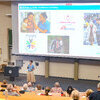Advancing health through innovation: The IDM’s journey
09 July 2024 | Story John Woodland and Yulisha Naidoo. Photo Migal Vanas. Read time 5 min.
The Institute of Infectious Disease and Molecular Medicine (IDM) at the University of Cape Town (UCT) is a leading centre for combating diseases in Africa. With over 30 research groups and multiple collaborative partners, the IDM fosters interdisciplinary research and innovation.
The institute stands as a beacon of scientific excellence in Africa. Established in 2004, its primary mission is to tackle major diseases affecting the continent, focusing on tuberculosis, HIV/AIDS, COVID-19 and various other infectious diseases alongside non-communicable diseases (NCDs) like cervical cancer and sickle cell disease.
With over 30 research groups, the institute operates as a collaborative hub with 33 full and 12 associate members leading the charge. Supported by a diverse team of over 460 staff members, including 60 postdoctoral fellows and 250 postgraduate students, the IDM fosters an environment of interdisciplinary research and innovation.
The IDM Fellows Programme nurtures early- to intermediate-level researchers aligned with the IDM’s vision. Exemplified by Anna-Ursula Happel and Melissa-Rose Abrahams, Ruby Bunjun, Michael Zulu, Ryan Dinkele, Simon Mendelsohn, Kathryn Wicht, and Musalula Sinkala, the programme showcases the institute's commitment to impactful global research and talent development.
“Identifying strategies to improve maternal and infant health in this region will contribute to the United Nations Sustainable Development Goal to ensure healthy lives and promote well-being for all ages.”
Dr Anna-Ursula Happel, who started off in the IDM Fellows Programme and is now an associate member epitomises the institute’s commitment to global collaboration and impactful research. Trained in Germany, Dr Happel’s immersion in Professor Jo-Ann Passmore’s laboratory at the IDM sparked her passion for HIV-related research in South Africa. Now a permanent resident, she aims to contribute to maternal and child health, aligning with the institute’s mission to address African health needs.

“Women and infants affected by HIV, including infants who are HIV-exposed but uninfected, make up a substantial proportion of the population on the African continent. Identifying strategies to improve maternal and infant health in this region will contribute to the United Nations Sustainable Development Goal to ensure healthy lives and promote well-being for all ages.”
Through her mentorship by IDM members, Happel aspires to establish a research centre focused on local health challenges, embodying the IDM’s ethos of innovative, community-driven solutions.
Bridging Science and Society
The IDM’s global recognition in HIV/AIDS research is bolstered by initiatives like the Genital Inflammation Test (GIFT), developed to improve women’s health in resource-limited settings. This reflects the institute’s mission to translate research into practical applications, fostering holistic innovation from laboratory to community.
“…having a job in which you are discovering and learning new things all the time is awesome.”
In March, GIFT in collaboration with UCT Hasso Plattner School of Design Thinking Afrika (d-school Afrika) and the IDM held a Speculum Deign-A-Thon, aimed at redesigning the 150-year-old speculum used during general gynaecological check-ups. Collaborative partnerships with numerous institutions locally and internationally underscore the institute’s dedication to interdisciplinary research and its pivotal role in driving scientific progress.
Dr Melissa-Rose Abrahams highlights the importance of fostering curiosity in scientific research, “Like many others in science, my interest stems from a love of ‘figuring things out’. I find the complexity of living organisms fascinating. Also, having a job in which you are discovering and learning new things all the time is awesome.”

Her focus lies in HIV research, particularly understanding barriers to the cure of HIV in African women. Recognising the disproportionate impact of HIV on African women, Dr Abrahams aims to implement strategies to study and address these barriers locally.
She commended the institute for its assistance in offering travel support: “The IDM supported travel to the United States for my postdoctoral fellow to learn a laboratory assay for characterising HIV persistence on treatment, which we are now implementing locally.”
This support underscores the IDM’s commitment to talent development and technology transfer. The institute prioritises capacity building, evident in the numerous prestigious international fellowships from the European and Developing Countries Clinical Trials Partnership (EDCTP), the Chan-Zuckerberg Initiative, the Royal Society’s Future Leaders–African Independent Research (FLAIR) programme, and the Wellcome Trust’s Investigator Awards, amongst others, which have been granted to its younger researchers.
The next article in this series will explore the ongoing research endeavours and impactful contributions of the IDM’s emerging scientists, shedding light on their innovative approaches to combating infectious diseases in Africa and the world.
Read the second article in the series.
 This work is licensed under a Creative Commons Attribution-NoDerivatives 4.0 International License.
This work is licensed under a Creative Commons Attribution-NoDerivatives 4.0 International License.
Please view the republishing articles page for more information.
Faculty of Health Sciences News
























